

The Scholarly Kitchen. Ithaka S+R. Various thoughts and papers in french and english. Curt Rice - Science in Balance. Planet RDF. Scholarly Communications. It is frequently interesting, and sometimes appalling, to see how a court that does not usually deal with copyright issues reacts when confronted with one.
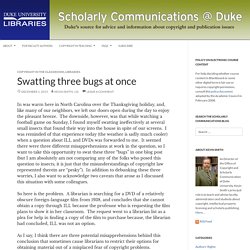
Judge Amy Berman Jackson of the U.S. District Court for the District of Columbia is certainly not a complete novice regarding copyright, but the issue she confronted in Drauglis V. Kappa Map Group must certainly have been a new one for her. It is a case involving the scope and interpretation of a Creative Commons license, and Judge Jackson deals quite well with it, in my opinion, in a decision issued last week.
But she is drawing lines in this case that I am quite sure will be discussed and readjusted over the next few years. The facts in the case pose a situation that anyone familiar with CC licensing could probably have seen coming. AI3: Adaptive Information. Michael Geist. AlphaGalileo. Harvard OA Tracking Project. Public Ethnography. OpenAIRE. Notes and Queries in Anthropology. Harvard Law: Future of the Internet. Does Santa Exist?
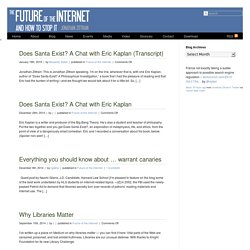
A Chat with Eric Kaplan (Transcript) January 19th, 2015 | by Benjamin Sobel | published in Future of the Internet | Comments Off Jonathan Zittrain: This is Jonathan Zittrain speaking. I’m on the line, wherever that is, with one Eric Kaplan, author of “Does Santa Exist? A Philosophical Investigation,” a book that I had the pleasure of reading and that Eric had the burden of writing—and we thought we would talk about it for a little bit. Does Santa Exist? December 26th, 2014 | by z | published in Future of the Internet | Comments Off Eric Kaplan is a writer and producer of the Big Bang Theory. Everything you should know about … warrant canaries December 8th, 2014 | by ngilens | published in Future of the Internet | 1 Comment Guest post by Naomi Gilens, J.D.
Why Libraries Matter. Simply Statistics. OCLC: Above the Fold. Above the Fold is an electronic publication that seeks to bring attention to items of interest from beyond our normal reading sphere.
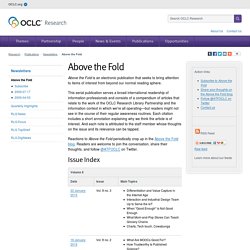
This serial publication serves a broad international readership of information professionals and consists of a compendium of articles that relate to the work of the OCLC Research Library Partnership and the information context in which we're all operating—but readers might not see in the course of their regular awareness routines. Each citation includes a short annotation explaining why we think the article is of interest. And each note is attributed to the staff member whose thoughts on the issue and its relevance can be tapped. Helen Walters: Writer, Editor. Berkman Interactive.
The Berkman Center's Interactive collection features conversations with and talks by leading cyber-scholars, entrepreneurs, activists, and policymakers as they explore topics such as: the factors that influence knowledge creation and dissemination in the digital age; the character of power as the worlds of governance, business, citizenship, and the media meet the Internet; and the opportunities, role, and limitations of new technologies in learning.
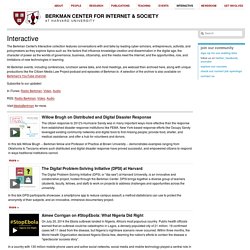
All Berkman events, including conferences, luncheon series talks, and most meetings, are webcast then archived here, along with unique productions like the Citizen Media Law Project podcast and episodes of Berkman.tv. A selection of the archive is also available on Berkman's YouTube channel. Serendipitous altruism. Ariadne: Web Magazine for Information Professionals. Open Access Archivangelism.
Lingua Editors Resign - OA Publishing. Last week, the editors for the linguistics journal Lingua had finally had enough.
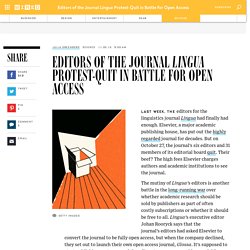
Elsevier, a major academic publishing house, has put out the highly regarded journal for decades. But on October 27, the journal’s six editors and 31 members of its editorial board quit. Their beef? The high fees Elsevier charges authors and academic institutions to see the journal. The mutiny of Lingua’s editors is another battle in the long-running war over whether academic research should be sold by publishers as part of often costly subscriptions or whether it should be free to all. The debate over open access is more complicated than free versus paid. “Everyone’s frustrated, but no one does anything about it,” Rooryck says. Academics and critics argue that corporations profit from research not just once but twice, and keep potential beneficiaries of the research from seeing it, especially as subscription costs increase. Scholarly OA.